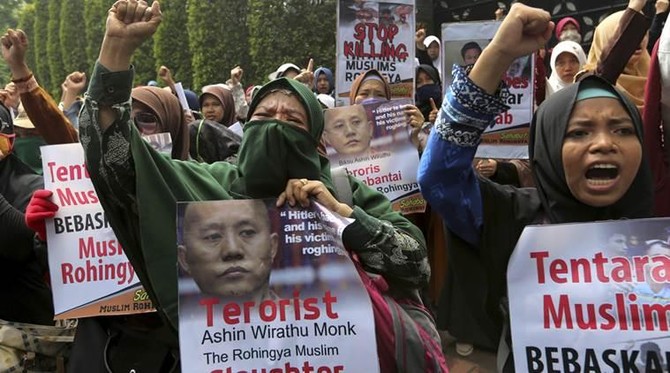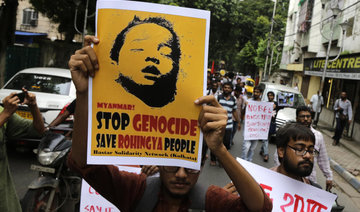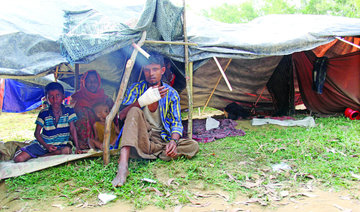JAKARTA: Indonesian police have pledged to bar Islamist groups from staging a rally on Friday at the Borobudur Buddhist temple in central Java to protest against the persecution of Myanmar’s Rohingya Muslims.
Islamist groups say they plan the demonstration close to the stupa-topped Borobudur temple, which dates from the 9th century and is a popular tourist site, to call for an end to violence against the religious and ethnic minority in Myanmar.
Indonesia has the world’s largest population of Muslims and there have been a number of anti-Myanmar protests in Jakarta and the Malaysian capital Kuala Lumpur over the treatment of Buddhist-majority Myanmar’s roughly 1.1 million Rohingyas.
Almost 125,000 Rohingyas have been forced to flee clashes between Rohingya insurgents and the army in the northwest Rakhine state. Tens of thousands have crossed the border into neighboring Bangladesh.
“The action at Borobudur temple will be prohibited,” National Police Chief Tito Karnavian told reporters, according to media.
“This is not just part of the heritage of Indonesia, but that of the world. There is no need for protests in response to the Rohingya conflict because the Indonesian government is taking action on it already.”
Indonesian Foreign Minister Retno Marsudi on Monday met Myanmar leader Aung San Suu Kyi and top security officials to call for a halt to the bloodshed. Marsudi was due in Dhaka, the Bangladeshi capital, on Tuesday.
Pakistani Foreign Minister Khawaja Muhammad Asif expressed “deep anguish at the ongoing violence against the Rohingya Muslims” and urged the Organization of Islamic Cooperation to take “immediate and effective action to bring an end to all human-rights violations against innocent and unarmed Rohingya Muslim population.”
An organizer of Friday’s planned protest said the groups wanted to protest peacefully near the Borobodur temple to show Indonesia’s tolerance.
“The Borobudur is an extraordinary symbol of tolerance,” said Anang Imamuddin. “We want the world to know that it is in a majority Muslim country but it is safe. Buddhist monks are safe here too.”
Indonesia to bar Myanmar protest at world’s biggest Buddhist temple
Indonesia to bar Myanmar protest at world’s biggest Buddhist temple

Trump names former staffer Katie Miller to Musk-led DOGE panel

- Katie Miller will soon be joining DOGE! She has been a loyal supporter of mine for many years, and will bring her professional experience to Government Efficiency, Trump posts
WASHINGTON: President-elect Donald Trump on Sunday named Katie Miller, who served in Trump’s first administration and is the wife of his incoming deputy chief of staff, as one of the first members of an advisory board to be led by billionaire allies Elon Musk and Vivek Ramaswamy that aims to drastically slash government spending, federal regulations and the federal workforce.
Miller, wife of Trump’s designated homeland security adviser Stephen Miller, will join Trump’s Department of Government Efficiency (DOGE), an informal advisory body that Trump has said will enable his administration to “slash excess regulations, cut wasteful expenditures, and restructure Federal Agencies.”
“Katie Miller will soon be joining DOGE! She has been a loyal supporter of mine for many years, and will bring her professional experience to Government Efficiency,” Trump posted in a message on his social media platform Truth Social.
Musk and Ramaswamy recently revealed plans to wipe out scores of federal regulations crafted by what they say is an anti-democratic, unaccountable bureaucracy, but have yet to announce members of the DOGE team. Musk has said he wants to slash the number of federal agencies from over 400 to 99.
Katie Miller had served in the first Trump adminstration as deputy press secretary for the Department of Homeland Security and as press secretary for former Vice President Mike Pence.
She is currently a spokesperson for the transition team for Trump’s designated Health and Human Services secretary, Robert Kennedy Jr.
Panama rejects Trump’s threat to take control of Canal

- Trump also complained of China’s growing influence around the canal, a worrying trend for American interests as US businesses depend on the channel to move goods between the Atlantic and Pacific oceans
PANAMA CITY: Panama’s president Jose Raul Mulino on Sunday dismissed recent threats made by US President-elect Donald Trump to retake control of the Panama Canal over complaints of “unfair” treatment of American ships.
“Every square meter of the Panama Canal and its adjacent areas belongs to Panama and will continue belonging to Panama,” Mulino said in a video posted to X.
Mulino’s public comments, though never mentioning Trump by name, come a day after the president-elect complained about the canal on his Truth Social platform.
“Our Navy and Commerce have been treated in a very unfair and injudicious way. The fees being charged by Panama are ridiculous,” he said.
Trump also complained of China’s growing influence around the canal, a worrying trend for American interests as US businesses depend on the channel to move goods between the Atlantic and Pacific oceans.
“It was solely for Panama to manage, not China, or anyone else,” Trump said. “We would and will NEVER let it fall into the wrong hands!“
The Panama Canal, which was completed by the United States in 1914, was returned to the Central American country under a 1977 deal signed by Democratic president Jimmy Carter.
Panama took full control in 1999.
Trump said that if Panama could not ensure “the secure, efficient and reliable operation” of the channel, “then we will demand that the Panama Canal be returned to us, in full, and without question.”
Mulino rejected Trump’s claims in his video message, though he also said he hopes to have “a good and respectful relationship” with the incoming administration.
“The canal has no direct or indirect control from China, nor the European Union, nor the United States or any other power,” Mulino said. “As a Panamanian, I reject any manifestation that misrepresents this reality.”
Later on Sunday, Trump responded to Mulino’s dismissal, writing on Truth Social: “We’ll see about that!“
Musk, president? Trump says ‘not happening’

- Trump: “He wasn’t born in this country”
“He’s not gonna be president, that I can tell you,” Trump told a Republican conference in Phoenix, Arizona.
“You know why he can’t be? He wasn’t born in this country,” Trump said of the Tesla and SpaceX boss, who was born in South Africa.
The US Constitution requires that a president be a natural-born US citizen.
Trump was responding to criticism, particularly from the Democratic camp, portraying the tech billionaire and world’s richest person as “President Musk” for the outsized role he is playing in the incoming administration.
As per ceding the presidency to Musk, Trump also assured the crowd: “No, no that’s not happening.”
The influence of Musk, who will serve as Trump’s “efficiency czar,” has become a focus point for Democratic attacks, with questions raised over how an unelected citizen can wield so much power.
And there is even growing anger among Republicans after Musk trashed a government funding proposal this week in a blizzard of posts — many of them wildly inaccurate — to his more than 200 million followers on his social media platform X.
Alongside Trump, Musk ultimately helped pressure Republicans to renege on a funding bill they had painstakingly agreed upon with Democrats, pushing the United States to the brink of budgetary paralysis that would have resulted in a government shutdown just days before Christmas.
Congress ultimately reached an agreement overnight Friday to Saturday, avoiding massive halts to government services.
Russian president meets Slovak PM as Ukraine gas transit contract nears expiry

- Fico has also been a rare senior EU politician to appear on Russian state TV following Moscow’s invasion of Ukraine
MOSCOW: Russia’s President Vladimir Putin met Slovak Prime Minister Robert Fico in the Kremlin on Sunday, a rare visit by a European Union leader to Moscow as a contract allowing for Russian gas to transit through Ukraine nears expiry.
Slovakia is dependent on gas passing through its neighbor Ukraine, and it has ramped up efforts to maintain those flows from 2025 while criticizing Ukrainian President Volodymyr Zelensky for refusing to extend the contract expiring at the end of the year.
Fico’s trip to Moscow was only the third by an EU government head since Russia invaded Ukraine in February 2022. Slovak opposition politicians called the visit a “disgrace.”
Fico said on Facebook after the meeting that top EU officials were informed of his trip on Friday.
He said it came in response to talks last week with Zelensky, who, according to the Slovak leader, had expressed opposition to any gas transit through Ukraine to Slovakia.
“Russian President V. Putin confirmed the readiness of the (Russian Federation) to continue to supply gas to the West and Slovakia, which is practically impossible after Jan. 1, 2025 in view of the stance of the Ukrainian president,” Fico said.
Fico came to power in 2023 and shifted Slovakia’s foreign policy. He immediately stopped state military aid to Kyiv, has said the war with Russia does not have a military solution, and has criticized sanctions against Moscow.
His visit to the Kremlin follows Austrian Chancellor Karl Nehammer, who visited in April 2022, and Hungarian Prime Minister Viktor Orban, who went to Moscow last July. EU allies had criticized both of those visits.
Russian television showed Putin and Fico shaking hands at the start of their talks. Kremlin spokesman Dmitry Peskov said the meeting had been arranged a few days ago.
In the talks, Fico said he and Putin exchanged opinions on the military situation in Ukraine, chances of a peaceful end to the war and on Slovak-Russian relations “which I intend to standardise.”
GAS TRANSIT
Slovakia, which has a long-term contract with Russia’s Gazprom, has been trying to keep receiving gas through Ukraine, saying buying elsewhere would cost it 220 million euros ($229 million) more in transit expenses.
Ukraine has repeatedly refused to extend the transit deal.
Fico pushed the subject on Thursday at a EU summit that was also attended by Zelensky, who reiterated his country would not continue the transit of Russian gas.
The Slovak prime minister, who has said his country was facing a gas crisis, has also spoken of solutions under which Ukraine would not transit Russian-owned gas, but rather gas owned by someone else.
Hungary has also been keen to keep the Ukrainian route, but it will continue to receive Russian gas from the south, via the TurkStream pipeline on the bed of the Black Sea.
Ex-Soviet Moldova has also relied on gas transiting Ukraine to supply its needs and those of its separatist Transdniestria enclave, including a thermal plant that provides most of the electricity for parts of Moldova under government control.
The acting head of Moldovagaz, the country’s gas operator, Vadim Ceban, said it could provide gas for Transdniestria acquired from other sources. But the pro-Russian region would have to pay higher prices associated with those supplies.
Ceban said Moldovagaz had made several appeals to Gazprom to send gas to Moldova through TurkStream and Bulgaria and Romania.
Ho Chi Minh City celebrates first metro

HO CHI MINH CITY: Thousands of selfie-taking Ho Chi Minh City residents crammed into train carriages Sunday as the traffic-clogged business hub celebrated the opening of its first-ever metro line after years of delays.
Huge queues spilled out of every station along the $1.7 billion line that runs almost 20 kilometers from the city center — with women in traditional “ao dai” dress, soldiers in uniform and couples clutching young children waiting excitedly to board.
“I know it (the project) is late, but I still feel so very honored and proud to be among the first on this metro,” said office worker Nguyen Nhu Huyen after snatching a selfie in her jam-packed train car.
“Our city is now on par with the other big cities of the world,” she said.
It took 17 years for Vietnam’s commercial capital to reach this point. The project, funded largely by Japanese government loans, was first approved in 2007 and slated to cost just $668 million.
When construction began in 2012, authorities promised the line would be up and running in just five years.
But as delays mounted, cars and motorbikes multiplied in the city of nine million people, making the metropolis hugely congested, increasingly polluted and time-consuming to navigate.
The metro “meets the growing travel needs of residents and contributes to reducing traffic congestion and environmental pollution,” the city’s deputy mayor Bui Xuan Cuong said.
Cuong admitted authorities had to overcome “countless hurdles” to get the project over the line.



















